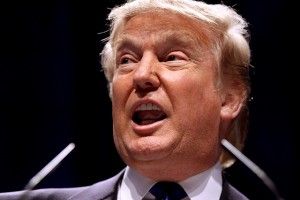San Bernardino attacks shape presidential race
by James Poulos | December 14, 2015 8:56 am

Gage Skidmore / flickr
Presidential candidates in both parties have found challenges and opportunities in responding politically to the recent terrorist attacks in San Bernardino, California.
In the wake of Tashfeen Malik’s attack, carried out with her husband Syed Rizwan Farook, controversy and criticism has centered around the way federal officials screen foreign immigrants for entry into the U.S. “In the aftermath of terrorist attacks in San Bernardino and Paris, this screening process has been singled out as a major vulnerability in the nation’s defense against terrorism,” the New York Times observed[1]. “Lawmakers from both parties have endorsed making it harder for people to enter the United States if they have recently been in Iraq or Syria.” President Obama himself “has ordered a review of the K-1 visa program, which allows foreigners like Ms. Malik to move to the United States to marry Americans, putting them on a pathway to permanent residence and, ultimately, citizenship,” the paper added.
But San Bernardino has given presidential candidates in both parties more of an occasion to sharpen their disagreements than to play up their common ground. While Republicans shared their disappointment over the rare Oval Office address delivered by President Obama to calm the nation’s nerves, they split dramatically over how to respond on the campaign trail.
Donald Trump had already heightened the debate by pushing against stricter gun controls in the wake of the terrorist attacks on Paris. “You look at Paris, no guns — nothing. And you look at California, no guns. I can tell you one thing, if I’m in there and had a gun, we’re going down shooting. We’re going to knock them out, okay,” he said on “Face the Nation” on CBS, according[2] to the Washington Post.
Offense and defense
After the San Bernardino attacks, he called for an immediate freeze on the entry of foreign Muslims, leaving several rivals to attempt what the Los Angeles Times called “the difficult balance of rebuking Trump while still trying to copy some of his appeal.” Jeb Bush, for instance, told[3] ABC’s “This Week” that Americans shouldn’t “target the religion” of Muslim immigrants. “We just have to target those that have co-opted the religion and make sure that we’re fully aware of the radicalizations taking place, not just here but all around the world,” he said, according to the Times.
In New Hampshire, Bush tried to shift the issue’s center of gravity away from national security toward foreign policy, less divisive this year but still politically salient. “If this is a war, and I believe it is since they have declared war on us, we need to declare war on them,” he said, Reuters reported[4].
Candidates in both parties have found campaign value in denigrating Trump’s approach. Chris Christie, for instance, flatly ridiculed Trump’s proposal. “You do not need to be banning Muslims from the country,” he said[5], echoing Democrats’ criticisms; in a Tweet, Hillary Clinton called it “reprehensible, prejudiced and divisive.” The Clinton camp appeared to make some calculations similar to Bush’s campaign, shifting the weight of her rhetoric toward America’s response to extremist Islam beyond U.S. borders. “Clinton has been speaking about combating terrorism at length since terrorists killed 130 people in Paris and 14 in San Bernardino,” CNN noted[6], although, more recently, “the former secretary of state argued that she is the ‘only candidate that’s been outlining a specific plan’ to defeat ISIS.”
A shifting mood
Nevertheless, the psychological fallout from the San Bernardino attacks has been strong enough to shift public opinion further in Trump’s direction than many might care to admit. “From the Capitol to the campaign trail, from Mr. Trump’s childhood neighborhood to the suburbs near the Islamic State-inspired killing of 14 people in San Bernardino, Calif., voters acknowledged, almost despite themselves, the gnawing sense of insecurity that has fueled Mr. Trump’s vision and persistent appeal,” the New York Times concluded[7] from a series of interviews with Americans conducted in and around New York City and early-primary states.
- observed: http://www.nytimes.com/2015/12/13/us/san-bernardino-attacks-us-visa-process-tashfeen-maliks-remarks-on-social-media-about-jihad-were-missed.html?_r=0
- according: https://www.washingtonpost.com/politics/san-bernardino-massacre-underlines-a-divide-among-contenders-in-2016-race/2015/12/06/07e3b6ae-9c4a-11e5-a3c5-c77f2cc5a43c_story.html
- told: http://www.latimes.com/nation/politics/trailguide/la-na-trailguide-12072015-htmlstory.html
- reported: http://www.reuters.com/article/us-usa-election-war-idUSKBN0TS16420151209#5ruKU1vZwiiqPVRB.99
- said: http://www.latimes.com/nation/politics/trailguide/la-na-trailguide-12072015-htmlstory.html
- noted: http://www.cnn.com/2015/12/11/politics/hillary-clinton-isis-terror-bernie-sanders/
- concluded: http://www.nytimes.com/2015/12/12/us/politics/even-donald-trumps-critics-admit-rising-anxiety-over-security.html
Source URL: https://calwatchdog.com/2015/12/14/san-bernardino-attacks-shape-presidential-race/